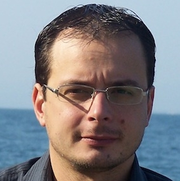Rocco Oliveto
Learning Empirical Software Engineering from my Mistakes

Abstract
When I started my PhD in 2004 I was unaware of the so-called Empirical Software Engineering. But quite soon I stated to learn about such a discipline (thanks to a guru of the field) and day after day I felt more and more attracted. I could not write a paper without reporting the results of a case study, the statistical analysis of the results achieved, the analysis of the threats to validity, and stuff like that. I was completely in love. But – as in the most beautiful love stories – the crisis is still there. And unfortunately (or fortunately) the crisis arrived also in my relationship with the Empirical Software Engineering. I realized that in my paper the experimental part was taking over on the definition of novel approaches and methodologies. In other words, my work was becoming boring. For this reason, I decided to “clarify” certain aspects of my relationship with the Empirical Software Engineering. And the synergy between Empirical Software Engineering and me increased again; the Empirical Software Engineering became the precious tool to validate the conjecture behind novel approaches and methodologies.
In this seminar I will present – retracing my hate & love relationship with the Empirical Software Engineering – how to design and report the results of an empirical study. I will also comment on the mistakes I made hoping that young researcher can learn from them and have a less “tempestuous” relationship with a fabulous discipline like Empirical Software Engineering. Last but not least, I will also reveal who is the guru who has made a spark between Empirical Software Engineering and me.
Speaker's Bio
Rocco Oliveto is Associate Professor at University of Molise (Italy), where he is also the Chair of the Computer Science program (since 2014) and the Director of the Laboratory of Computer Science and Scientific Computation (CSSC Lab). He co-authored over 100 papers on topics related to software traceability, software maintenance and evolution, search-based software engineering, and empirical software engineering. His activities span various international software engineering research communities. He has served as organizing and program committee member of several international conferences in the field of software engineering. He was program co-chair of ICPC 2015, TEFSE 2015 and 2009, SCAM 2014, WCRE 2013 and 2012.
|



